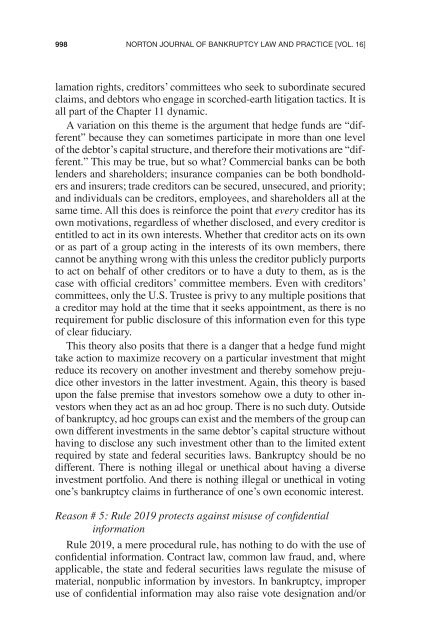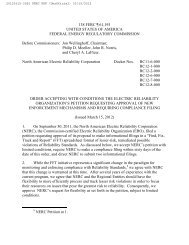Ad Hoc Committees and the Misuse of Bankruptcy Rule 2019
Ad Hoc Committees and the Misuse of Bankruptcy Rule 2019
Ad Hoc Committees and the Misuse of Bankruptcy Rule 2019
Create successful ePaper yourself
Turn your PDF publications into a flip-book with our unique Google optimized e-Paper software.
998 Norton Journal <strong>of</strong> <strong>Bankruptcy</strong> Law <strong>and</strong> Practice [Vol. 16]<br />
lamation rights, creditors’ committees who seek to subordinate secured<br />
claims, <strong>and</strong> debtors who engage in scorched-earth litigation tactics. It is<br />
all part <strong>of</strong> <strong>the</strong> Chapter 11 dynamic.<br />
A variation on this <strong>the</strong>me is <strong>the</strong> argument that hedge funds are “different”<br />
because <strong>the</strong>y can sometimes participate in more than one level<br />
<strong>of</strong> <strong>the</strong> debtor’s capital structure, <strong>and</strong> <strong>the</strong>refore <strong>the</strong>ir motivations are “different.”<br />
This may be true, but so what Commercial banks can be both<br />
lenders <strong>and</strong> shareholders; insurance companies can be both bondholders<br />
<strong>and</strong> insurers; trade creditors can be secured, unsecured, <strong>and</strong> priority;<br />
<strong>and</strong> individuals can be creditors, employees, <strong>and</strong> shareholders all at <strong>the</strong><br />
same time. All this does is reinforce <strong>the</strong> point that every creditor has its<br />
own motivations, regardless <strong>of</strong> whe<strong>the</strong>r disclosed, <strong>and</strong> every creditor is<br />
entitled to act in its own interests. Whe<strong>the</strong>r that creditor acts on its own<br />
or as part <strong>of</strong> a group acting in <strong>the</strong> interests <strong>of</strong> its own members, <strong>the</strong>re<br />
cannot be anything wrong with this unless <strong>the</strong> creditor publicly purports<br />
to act on behalf <strong>of</strong> o<strong>the</strong>r creditors or to have a duty to <strong>the</strong>m, as is <strong>the</strong><br />
case with <strong>of</strong>ficial creditors’ committee members. Even with creditors’<br />
committees, only <strong>the</strong> U.S. Trustee is privy to any multiple positions that<br />
a creditor may hold at <strong>the</strong> time that it seeks appointment, as <strong>the</strong>re is no<br />
requirement for public disclosure <strong>of</strong> this information even for this type<br />
<strong>of</strong> clear fiduciary.<br />
This <strong>the</strong>ory also posits that <strong>the</strong>re is a danger that a hedge fund might<br />
take action to maximize recovery on a particular investment that might<br />
reduce its recovery on ano<strong>the</strong>r investment <strong>and</strong> <strong>the</strong>reby somehow prejudice<br />
o<strong>the</strong>r investors in <strong>the</strong> latter investment. Again, this <strong>the</strong>ory is based<br />
upon <strong>the</strong> false premise that investors somehow owe a duty to o<strong>the</strong>r investors<br />
when <strong>the</strong>y act as an ad hoc group. There is no such duty. Outside<br />
<strong>of</strong> bankruptcy, ad hoc groups can exist <strong>and</strong> <strong>the</strong> members <strong>of</strong> <strong>the</strong> group can<br />
own different investments in <strong>the</strong> same debtor’s capital structure without<br />
having to disclose any such investment o<strong>the</strong>r than to <strong>the</strong> limited extent<br />
required by state <strong>and</strong> federal securities laws. <strong>Bankruptcy</strong> should be no<br />
different. There is nothing illegal or unethical about having a diverse<br />
investment portfolio. And <strong>the</strong>re is nothing illegal or unethical in voting<br />
one’s bankruptcy claims in fur<strong>the</strong>rance <strong>of</strong> one’s own economic interest.<br />
Reason # 5: <strong>Rule</strong> <strong>2019</strong> protects against misuse <strong>of</strong> confidential<br />
information<br />
<strong>Rule</strong> <strong>2019</strong>, a mere procedural rule, has nothing to do with <strong>the</strong> use <strong>of</strong><br />
confidential information. Contract law, common law fraud, <strong>and</strong>, where<br />
applicable, <strong>the</strong> state <strong>and</strong> federal securities laws regulate <strong>the</strong> misuse <strong>of</strong><br />
material, nonpublic information by investors. In bankruptcy, improper<br />
use <strong>of</strong> confidential information may also raise vote designation <strong>and</strong>/or



